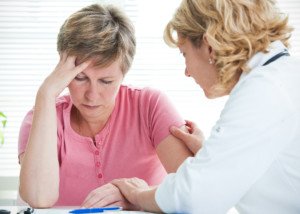
Are you a teen who’s very worried about irregular periods and unexplained weight gain despite no change in diet?
There can be a medical cause to this. It’s called polycystic ovarian syndrome (PCOS).
“PCOS and weight gain are closely related,” says Heather Bartos, MD, a board certified OBGYN, and chief of Obstetrics & Gynecology at Texas Health Presbyterian Hospital in Denton, TX.
“PCOS is a syndrome, as the name says, and part of the constellation of symptoms is obesity, hair growth and hair loss (from the head), acne, type 2 diabetes or metabolic syndrome, infertility and irregular periods.
“In PCOS there is too much androgen, and androgens are produced in three areas — the adrenal glands, ovaries and fat cells.”
Irregular Periods and Weight Gain in Teens Are Not Always Caused by PCOS.
On average, menstruation begins at age 12, and for a few years after that, may be irregular — and this can be normal.
Irregular periods can also result from strenuous aerobic activity or athletic training.
A girl may also gain weight due to benign causes such as quitting sports or lifestyle changes such as more food in the house because Mom has remarried, or a new babysitting job in which there’s a ton of junk food in the house.
However, within about two years after a girl’s period starts, the cycle should no longer be irregular.
In other cases, however, doctors may attribute irregular periods (and weight gain) in teens as normal, due to their young age — when all along, the situation is being caused by PCOS.
When especially older teens have irregular periods, particularly coupled with unexplained weight gain, PCOS should be suspected.
The excess androgens causes imbalances in hormones and interferes with the menstrual cycle.
PCOS needs treatment at the time it’s diagnosed. In women it increases the risk for high blood pressure, high cholesterol and uterine cancer.
How a Teen Can Tell what the Cause of Her Weight Gain and Irregular Periods Are
There may be more than one cause at play. The weight gain may be from both PCOS and a change in lifestyle.
But if you add new-onset irregular periods to the equation, this heightens the possibility for PCOS.
So how can you tell what’s really going on? See a gynecologist for a complete exam. You cannot diagnose PCOS yourself.
“If a person with PCOS can lose weight, they can help reduce some of the circulating androgens — which would have positive effects on their health,” says Dr. Bartos.
What NOT to Do to Lose Weight
- Take up smoking
- Take “fat burning” pills
- Go on a crash or “starvation” diet
- Go on a fad diet like liquid protein or some other NON-sustainable diet.
- Become obsessive with exercise.
Instead, practice portion control, increase intake of fruits and vegetables, take up an aerobic activity and start strength training. Yoga will also help.
 Dr. Bartos served as an assistant clinical professor of OBGYN at the Uniformed Services University of Health Sciences for several years and was a physician in the U.S. Navy for eight years.
Dr. Bartos served as an assistant clinical professor of OBGYN at the Uniformed Services University of Health Sciences for several years and was a physician in the U.S. Navy for eight years.
 Lorra Garrick has been covering medical, fitness and cybersecurity topics for many years, having written thousands of articles for print magazines and websites, including as a ghostwriter. She’s also a former ACE-certified personal trainer.
Lorra Garrick has been covering medical, fitness and cybersecurity topics for many years, having written thousands of articles for print magazines and websites, including as a ghostwriter. She’s also a former ACE-certified personal trainer.
.









































